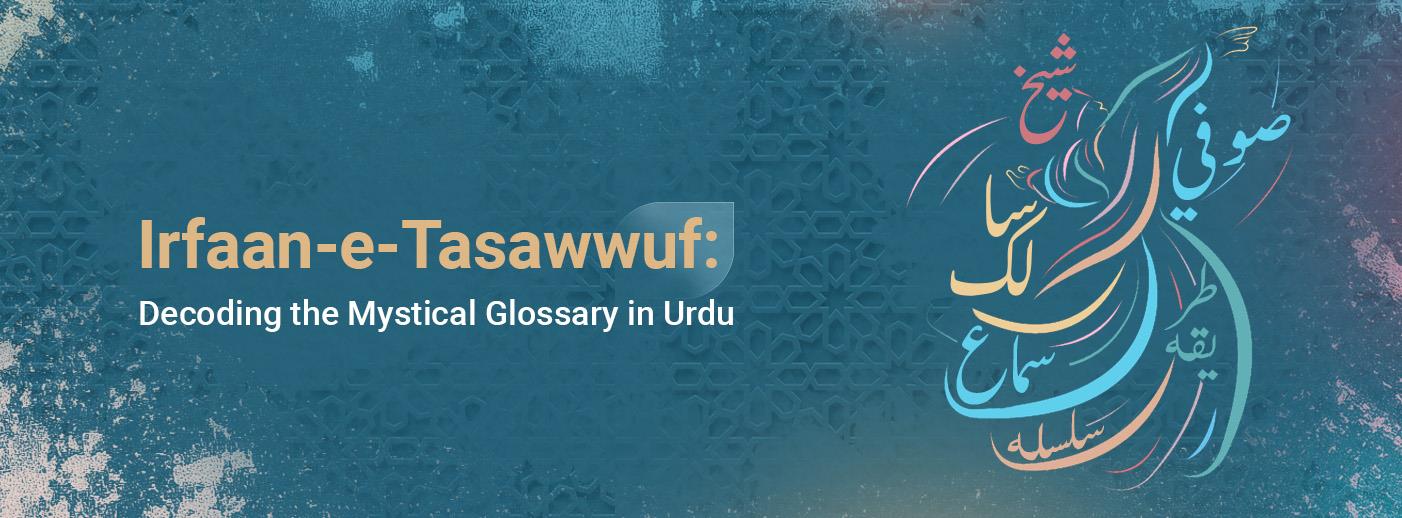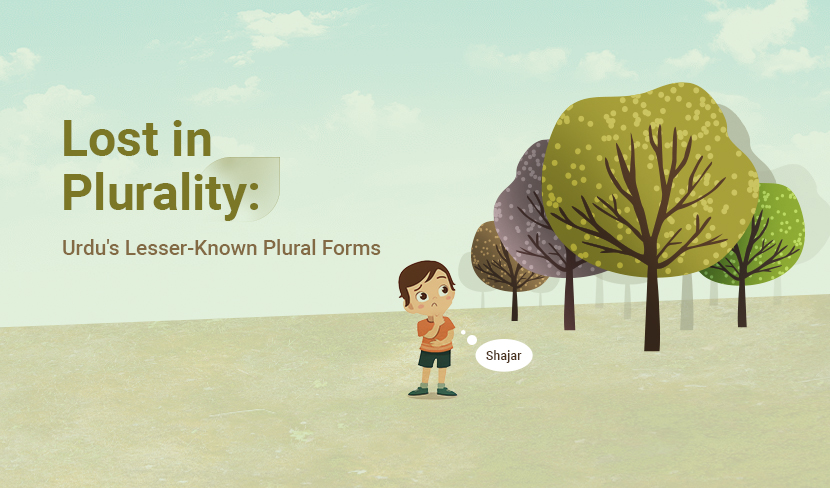زیادہ تلاش کیے گئے الفاظ
محفوظ شدہ الفاظ
کِھسیانی بِلّی کَھمبا نوچے
جسے غصہ آرہا ہو وہ دوسروں پر اپنی جھلاہٹ اتارتا ہے، بے بسی میں آدمی دوسروں پر غصہ اتارتا ہے، شرمندہ شخص دوسروں پر اپنی شرمندگی اتارتا ہے، کمزور کی جھنجھلاہٹ
چَمَنِسْتان
ایسا باغ جہاں پھول کثرت سے ہوں، ایسی جگہ جہاں دور تک پھول ہی پھول اور سبزہ سبزہ نظر آئے، گلزار، گلستان، باغ، پھولوں کا قطعہ، سبز کھیت
Irfaan-e-Tasawwuf: Decoding the Mystical Glossary in Urdu

Since time immemorial, humans have manifested their profound divine connection with the Almighty in myriad ways. Since its inception, Urdu has served as an eloquent medium, embracing countless poets, rhymesters, lyricists, mystics, and Sufis across the Indian Sub-continent. Consequently, over time, it has generated an unending treasury of divine expressions and intricately woven mystic terminologies.
Hence, it became imperative for Urdu scholars to interpret and illuminate these terms in a simple and plain language. By doing so, we can seamlessly bridge the linguistic divide in our society, enabling every Urdu enthusiast to comprehend and relish these expressions. During this journey, we shall explore the meanings and usages of various mystic and Sufi terms employed in prose and poetry. We will also illustrate how a single word can embody multiple meanings.
Another significant facet to accentuate in my intro is the intense connection between a layperson and Urdu poetry. Urdu poetry is generously over-abandoned with allegories, metaphors, tropes, and figurative expressions. This endeavor aims at meticulously uncovering the hidden gems of Urdu poetry. Let's embark on this journey of divine exploration into Sufi terms and phrases.
Since its inception, Sufism has captivated the attention of countless scholars and writers from every corner of the world. India stands out as one of the foremost countries where Sufi literature has flourished, spreading its message to millions of seekers of the divine. Today, I begin our exploration with the word "Suufii." The etymology of Suufii dates back to the early centuries of Islam. The word "Suufii" (صوفي) has rich etymological roots, with several theories about its origin. Here are some of the primary perspectives:
The most widely accepted theory propounds that "Suufii" is derived from the Arabic word "ṣūf" (صوف), meaning "wool." Early Suufiis were known for wearing simple woolen garments, symbolizing their ascetic lifestyle and renunciation of over-luxurious pleasures. Another theory suggests that "Suufii" comes from the Greek word "Sophia," which means "wisdom," emphasizing the Sufi pursuit of divine wisdom and enlightenment. However, this theory is less commonly accepted compared to the Arabic origin. Additionally, some link "Suufii" to the Arabic word "ṣafā" (صفاء), meaning "purity" or "sincerity," highlighting the emphasis on spiritual purity and sincere devotion in Sufism. These etymological roots reflect the various dimensions of Sufism, from its ascetic practices to its pursuit of divine wisdom and spiritual purity.
The next pick is Saalik (سالک), derived from the Arabic verb ‘salaka’ (to walk). Saalik is the active participle of Salaka, meaning the one who walks or goes along. In Sufi terminology, Saalik refers to a traveler or walker on the path of devotion and the divine, who chooses a mystic path. Another term often used interchangeably is Saalik-e-Raah (سالک راہ), denoting an explorer of a mystic path, who progresses through hard work. One of the most crucial and pivotal terms in Sufi studies and Sufism is Shaykh (شيخ). The word Shaykh originates from the Arabic verb 'shaakha' (شاخ), meaning to grow old or age. In a literal sense, Shaykh (شيخ) signifies elder, aged, leader, master, or chief. However, within the context of Sufism, it refers to a spiritual leader who supervises, mentors and guides mystic disciples.
Our next word is Samaa' (سماع), an Arabic word meaning listening or hearing. In the Sufi context, Sama (سماع) refers to a spiritual practice that involves listening to divine discourse, godly sayings, spiritual prose, poetry, or other sacred musical sounds. This practice aims to elevate the soul and bring practitioners closer to the divine. Sama (سماع) is a sort of mystical gathering where participants engage in deep, meditative listening, often accompanied by specific Sufi dance or other movements, to facilitate a direct experience of spiritual ecstasy or divine presence. Although the practice of Sama varies among different Sufi orders, its ultimate purpose remains the same: to transcend the self, achieve spiritual purification, and attain closer proximity to God.
Another essential term for understanding Sufism more intensely is the word Silsila (سلسله). Originating from Arabic, its literal meaning is chain or series. In the Sufi tradition, however, Silsila (سلسله) refers to a spiritual chain or lineage that traces the succession of Sufi masters and disciples back to the first spiritual guide of the order. The concept of Silsila (سلسله) embodies the transmission of spiritual knowledge, practices, and blessings from one generation of Sufi masters to the next. It ensures that the spiritual authority and guidance provided by a Sufi master are rooted in a legitimate and continuous line of transmission. Each Sufi order (tariqa) has its own Silsila, often documented through a genealogical tree that lists the names of the masters and their disciples.
The last term for today's write-up is Tariqa (طريقه). It is one of the most fundamental terms in Sufism. It’s an Arabic word meaning way, path, method, style, or course of action. In the Sufi setup, Tariqa (طريقه) refers to a Sufi order or brotherhood that provides a structured path for spiritual development and the pursuit of closeness to God. Tariqa denotes a system of spiritual practices, teachings, and rituals designed to help individuals progress on their spiritual journey. A Tariqa (طريقه) is typically founded by a charismatic spiritual leader or saint, known as a Sheikh or Pir, who already has achieved a high level of spiritual realization. The leader's teachings and practices form the core of the Tariqa, and their successors continue to guide followers according to these principles. Qadiriyya, Naqshbandiyya, Chishtiyya, and Mevleviyya are among the most well-known Sufi orders worldwide.
In conclusion, the mystical terminology of Urdu, deeply intertwined with Sufism, offers a rich tapestry of words that encapsulate the essence of the divine journey. Each term, from "Sufism" to "Tariqa," illuminates unique aspects of the Sufi path. Understanding these terms transcends mere definitions, inviting us to appreciate the profound spiritual and cultural heritage they represent. By decoding these terms, we bridge the linguistic gap and bring Sufi wisdom closer to Urdu enthusiasts and laypeople. This exploration enhances our understanding of Urdu poetry and prose, unveiling hidden meanings and deepening our appreciation of the quest for spiritual enlightenment and the Divine.
Delete 44 saved words?
کیا آپ واقعی ان اندراجات کو حذف کر رہے ہیں؟ انہیں واپس لانا ناممکن ہوگا۔






